Turkish politician fined over genocide denial
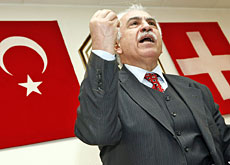
A Swiss district court has found a Turkish politician, Doğu Perinçek, guilty of racial discrimination for denying the 1915 Armenian massacre was genocide.
The court in Lausanne agreed with the prosecutor’s demand and handed Perinçek a suspended fine of SFr9,000 ($7,336) as well as a one-off financial penalty of SFr3,000.
The court also ruled that Perinçek would have to pay SFr1,000 to the Swiss-Armenian Association as a symbolic gesture.
The politician, whose left-wing Turkish Workers’ Party has no seats in the Turkish parliament, was brought to court after calling the genocide “an international lie” during a public speech in Lausanne in July 2005.
Under the Swiss penal code any act of denying, belittling or justifying genocide is a violation of the country’s anti-racism legislation.
And Lausanne is the capital of canton Vaud, one of two Swiss cantons along with Geneva where the parliaments have voted in recent years to recognise the Armenian massacre as genocide.
Judge Pierre-Henri Winzap accused Perinçek of being “a racist” and “an arrogant provocateur” who was familiar with Swiss law on historical revisionism.
According to Winzap, the politician’s action “appears to have racist and nationalist motives”. The Armenian genocide is “an established historical fact according to the Swiss public”, he added.
Perinçek’s lawyers have called into question the authority of the district court to hear such a case. The Turkish politician said he would appeal against the verdict, which he called “racist and imperialist”.
He admitted in court earlier in the week that there had been massacres but said there could be no talk of genocide. “I have not denied genocide because there was no genocide,” he argued.
Armenians maintain the mass killings in 1915 were genocide, a charge Turkey disputes.
Reactions
Sarkis Shahinian, co-president of the Swiss-Armenian Association, said there was “great relief” among the community. Shahinian said it was deplorable that the Turkish state had let itself get involved with ultra-nationalists like Perinçek.
“It is a big problem. It is necessary that Turkey recognizes the genocide.”
Ferai Tinç, a foreign affairs columnist with Turkey’s Hurriyet newspaper, told swissinfo the case had been widely followed in the country because it was the first time a Turkish citizen had been tried abroad for expressing their opinion.
“We see it as a trial of freedom of thought, and freedom of opinion,” Tinç said.
“Whether we agree or not with Perinçek, we find these type of [penal] articles against freedom of opinion dangerous because we are struggling in our country to achieve freedom of thought.”
Tinç added that the decision to make Perinçek stand trial would “create a problem of confidence” between Switzerland and Turkey.
Shaky ground
Ties between Bern and Ankara are already on shaky ground.
Tensions reached a peak in 2005 after Turkey criticised the Swiss authorities’ decision to investigate Perinçek. Ankara followed it up by cancelling an official trip to Turkey by the then Swiss economics minister, Joseph Deiss.
The next event to raise eyebrows was a visit to Turkey by Swiss Justice Minister Christopher Blocher last October when he announced that Switzerland’s anti-racism legislation was incompatible with freedom of expression.
The comments were welcomed by Ankara but caused a storm of protest in Switzerland.
Blocher came in for renewed criticism by the media and some politicians last weekend when he received his Turkish counterpart Cemil Cicek in Bern. According to the justice ministry, bilateral issues – and not the trial – were discussed.
On Friday Blocher said he did not want to comment on the trial directly, but did not expect the verdict to lead to a serious deterioration in Swiss-Turkish relations.
swissinfo with agencies
In 2001 a court in canton Bern acquitted several Turks accused of denying the Armenian genocide.
Its reasons were the lack of an official recognition of the genocide as such in Switzerland and the “obtuse nationalism” of the accused. The federal court, Switzerland’s highest legal authority, confirmed the acquittal in 2002.
In 2005, Swiss authorities also launched criminal investigations against the historian Yusuf Halacoglu, the president of the Turkish History Organisation, for allegedly denying the 1915 Armenian massacre while in Switzerland.
The Armenians say Ottoman Turks slaughtered up to 1.8 million Armenians in a planned genocide between 1915 and 1918. Turkey denies the mass killings were genocide, saying the death toll is inflated.
So far most historians, the Council of Europe, the French parliament and the Swiss House of Representatives – along with cantons Vaud and Geneva – have all recognised the events as genocide. But neither the Senate nor the cabinet has officially done so.
The Armenian question has long affected relations between Switzerland and Turkey, including the postponing of official visits.

In compliance with the JTI standards
More: SWI swissinfo.ch certified by the Journalism Trust Initiative
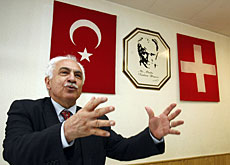
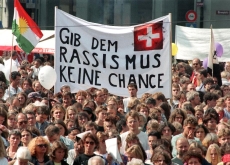
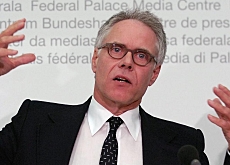
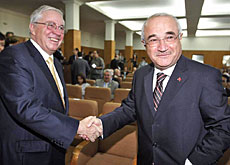
You can find an overview of ongoing debates with our journalists here. Please join us!
If you want to start a conversation about a topic raised in this article or want to report factual errors, email us at english@swissinfo.ch.